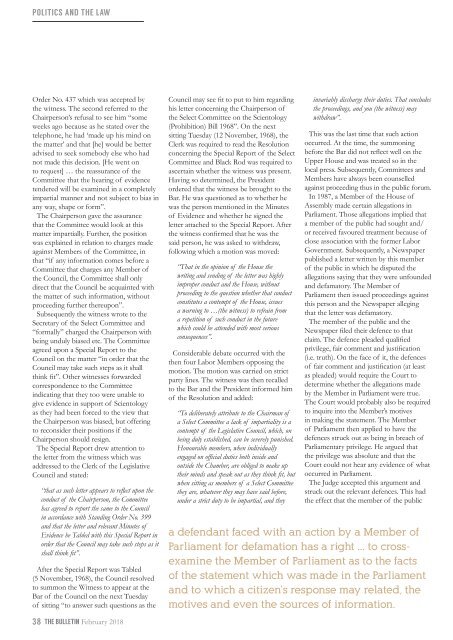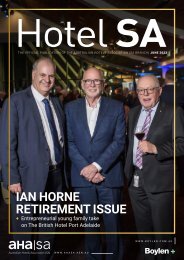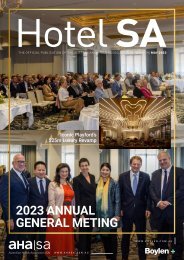LSB February 2018_Web_LSSA
Create successful ePaper yourself
Turn your PDF publications into a flip-book with our unique Google optimized e-Paper software.
POLITICS AND THE LAW<br />
Order No. 437 which was accepted by<br />
the witness. The second referred to the<br />
Chairperson’s refusal to see him “some<br />
weeks ago because as he stated over the<br />
telephone, he had ‘made up his mind on<br />
the matter’ and that [he] would be better<br />
advised to seek somebody else who had<br />
not made this decision. [He went on<br />
to request] … the reassurance of the<br />
Committee that the hearing of evidence<br />
tendered will be examined in a completely<br />
impartial manner and not subject to bias in<br />
any way, shape or form”.<br />
The Chairperson gave the assurance<br />
that the Committee would look at this<br />
matter impartially. Further, the position<br />
was explained in relation to charges made<br />
against Members of the Committee, in<br />
that “if any information comes before a<br />
Committee that charges any Member of<br />
the Council, the Committee shall only<br />
direct that the Council be acquainted with<br />
the matter of such information, without<br />
proceeding further thereupon”.<br />
Subsequently the witness wrote to the<br />
Secretary of the Select Committee and<br />
“formally” charged the Chairperson with<br />
being unduly biased etc. The Committee<br />
agreed upon a Special Report to the<br />
Council on the matter “in order that the<br />
Council may take such steps as it shall<br />
think fit”. Other witnesses forwarded<br />
correspondence to the Committee<br />
indicating that they too were unable to<br />
give evidence in support of Scientology<br />
as they had been forced to the view that<br />
the Chairperson was biased, but offering<br />
to reconsider their positions if the<br />
Chairperson should resign.<br />
The Special Report drew attention to<br />
the letter from the witness which was<br />
addressed to the Clerk of the Legislative<br />
Council and stated:<br />
“that as such letter appears to reflect upon the<br />
conduct of the Chairperson, the Committee<br />
has agreed to report the same to the Council<br />
in accordance with Standing Order No. 399<br />
and that the letter and relevant Minutes of<br />
Evidence be Tabled with this Special Report in<br />
order that the Council may take such steps as it<br />
shall think fit”.<br />
After the Special Report was Tabled<br />
(5 November, 1968), the Council resolved<br />
to summon the Witness to appear at the<br />
Bar of the Council on the next Tuesday<br />
of sitting “to answer such questions as the<br />
38 THE BULLETIN <strong>February</strong> <strong>2018</strong><br />
Council may see fit to put to him regarding<br />
his letter concerning the Chairperson of<br />
the Select Committee on the Scientology<br />
(Prohibition) Bill 1968”. On the next<br />
sitting Tuesday (12 November, 1968), the<br />
Clerk was required to read the Resolution<br />
concerning the Special Report of the Select<br />
Committee and Black Rod was required to<br />
ascertain whether the witness was present.<br />
Having so determined, the President<br />
ordered that the witness be brought to the<br />
Bar. He was questioned as to whether he<br />
was the person mentioned in the Minutes<br />
of Evidence and whether he signed the<br />
letter attached to the Special Report. After<br />
the witness confirmed that he was the<br />
said person, he was asked to withdraw,<br />
following which a motion was moved:<br />
“That in the opinion of the House the<br />
writing and sending of the letter was highly<br />
improper conduct and the House, without<br />
proceeding to the question whether that conduct<br />
constitutes a contempt of the House, issues<br />
a warning to …(the witness) to refrain from<br />
a repetition of such conduct in the future<br />
which could be attended with most serious<br />
consequences”.<br />
Considerable debate occurred with the<br />
then four Labor Members opposing the<br />
motion. The motion was carried on strict<br />
party lines. The witness was then recalled<br />
to the Bar and the President informed him<br />
of the Resolution and added:<br />
“To deliberately attribute to the Chairman of<br />
a Select Committee a lack of impartiality is a<br />
contempt of the Legislative Council, which, on<br />
being duly established, can be severely punished.<br />
Honourable members, when individually<br />
engaged on official duties both inside and<br />
outside the Chamber, are obliged to make up<br />
their minds and speak out as they think fit, but<br />
when sitting as members of a Select Committee<br />
they are, whatever they may have said before,<br />
under a strict duty to be impartial, and they<br />
invariably discharge their duties. That concludes<br />
the proceedings, and you (the witness) may<br />
withdraw”.<br />
This was the last time that such action<br />
occurred. At the time, the summoning<br />
before the Bar did not reflect well on the<br />
Upper House and was treated so in the<br />
local press. Subsequently, Committees and<br />
Members have always been counselled<br />
against proceeding thus in the public forum.<br />
In 1987, a Member of the House of<br />
Assembly made certain allegations in<br />
Parliament. Those allegations implied that<br />
a member of the public had sought and/<br />
or received favoured treatment because of<br />
close association with the former Labor<br />
Government. Subsequently, a Newspaper<br />
published a letter written by this member<br />
of the public in which he disputed the<br />
allegations saying that they were unfounded<br />
and defamatory. The Member of<br />
Parliament then issued proceedings against<br />
this person and the Newspaper alleging<br />
that the letter was defamatory.<br />
The member of the public and the<br />
Newspaper filed their defence to that<br />
claim. The defence pleaded qualified<br />
privilege, fair comment and justification<br />
(i.e. truth). On the face of it, the defences<br />
of fair comment and justification (at least<br />
as pleaded) would require the Court to<br />
determine whether the allegations made<br />
by the Member in Parliament were true.<br />
The Court would probably also be required<br />
to inquire into the Member’s motives<br />
in making the statement. The Member<br />
of Parliament then applied to have the<br />
defences struck out as being in breach of<br />
Parliamentary privilege. He argued that<br />
the privilege was absolute and that the<br />
Court could not hear any evidence of what<br />
occurred in Parliament.<br />
The Judge accepted this argument and<br />
struck out the relevant defences. This had<br />
the effect that the member of the public<br />
a defendant faced with an action by a Member of<br />
Parliament for defamation has a right ... to crossexamine<br />
the Member of Parliament as to the facts<br />
of the statement which was made in the Parliament<br />
and to which a citizen’s response may related, the<br />
motives and even the sources of information.


















